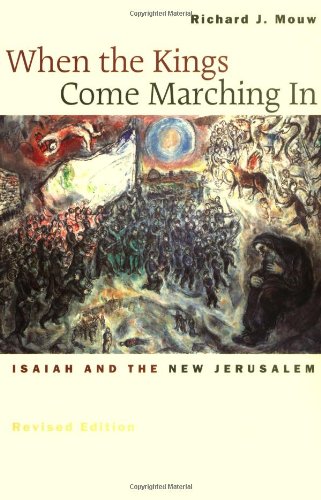Book review: When the Kings Come Marching In
by Richard J. Mouw
★★★★
This is a 2002 revised edition that I bought out of curiosity because of its subtitle: Isaiah and the New Jerusalem. There are so many strange theories about the New Jerusalem floating around that I felt it would be a relief to read what a professor had to say, based on the vision of Isaiah that kicked off the whole dream in the first place.
It’s fascinating to me that Mouw matter-of-factly assumes his readers agree literally with what the scriptures say about an afterlife, on earth, in the New Jerusalem. This New Jerusalem is unquestionably described in both Isaiah and Revelation as a city on earth, and that’s how Mouw reads it. Yet Mouw speculates about whether household pets have souls, and what our heavenly bodies will be like. He wonders what it really means when scripture says the ships of Tarshish shall come to the city, bringing cedars from Lebanon. There must be present-day analogies to these things, since this is presumably still in our future, so he goes searching for the “proud and lofty” things of present day cultures to make sense of ancient promises. Mouw assumes his readers picture heaven as real, physical, in the future, and on earth, not up behind the clouds.
Of course Mouw is right and the Bible does describe the New Jerusalem as a city on earth. Nobody who carefully reads Isaiah chapter 60 (the book’s proof text), or the last couple of chapters of Revelation, could conclude otherwise. Isaiah dreams of a day when God will be back in control of this world, and Revelation posits that it will happen in conjunction with a bodily resurrection to live again on earth—using imagery that most lay Christians today correlate with heaven. Hence the provocative title of Mouw’s book: “When the Kings Come Marching In.” Both Isaiah and Revelation describe kings of the nations visiting the New Jerusalem.
That’s an intriguing picture, isn’t it? What are these pagan kings doing in “heaven”? Or do they come from Christian nations? Are they all saved? This puzzle highlights the complexity of trying to read the Old Testament from a Christian standpoint, since when Isaiah made that promise, there was no Christian concept of “saved” or “unsaved.” Mouw speculates that the kings come to Jerusalem for a different kind of transaction, rather than to be accepted among the saved. Perhaps they bring the “wealth of the nations” to God’s people. Or perhaps they come (presumably against their will) to be judged, because justice must be done and God’s people must be avenged publicly.
There is much more to the book, of course; I’m merely highlighting the topic of the book’s title. I find this book to be a curious blending of ancient and modern beliefs, and wonder if it doesn’t do violence to both by trying to merge both together like pieces of a puzzle.












 354 Circles
354 Circles
 603 Goodreads Friends & Fans
603 Goodreads Friends & Fans

 Hello! I'm an author, historical Jesus scholar, book reviewer, and liberal Christian, which means I appreciate and attempt to exercise the humanitarian teachings of Jesus without getting hung up on any particular supernatural or religious beliefs.
The Bible is a magnificent book that has inspired and spiritually fed generations for thousands of years, and each new century seems to bring a deeper understanding of life’s purpose. This is true of not only Christianity; through the years, our age-old religions are slowly transforming from superstitious rituals into humanitarian philosophies. In short, we are growing up, and I am thrilled to be riding the wave.
I avidly read all thought-provoking religion titles. New authors: I'd love to read and review your book!
Hello! I'm an author, historical Jesus scholar, book reviewer, and liberal Christian, which means I appreciate and attempt to exercise the humanitarian teachings of Jesus without getting hung up on any particular supernatural or religious beliefs.
The Bible is a magnificent book that has inspired and spiritually fed generations for thousands of years, and each new century seems to bring a deeper understanding of life’s purpose. This is true of not only Christianity; through the years, our age-old religions are slowly transforming from superstitious rituals into humanitarian philosophies. In short, we are growing up, and I am thrilled to be riding the wave.
I avidly read all thought-provoking religion titles. New authors: I'd love to read and review your book!
 Hi! While Lee writes the articles and reviews the books, I edit, organize, and maintain the blog. The views expressed here are Lee's but I'm his biggest supporter! :-)
Hi! While Lee writes the articles and reviews the books, I edit, organize, and maintain the blog. The views expressed here are Lee's but I'm his biggest supporter! :-)
Connect With Me!